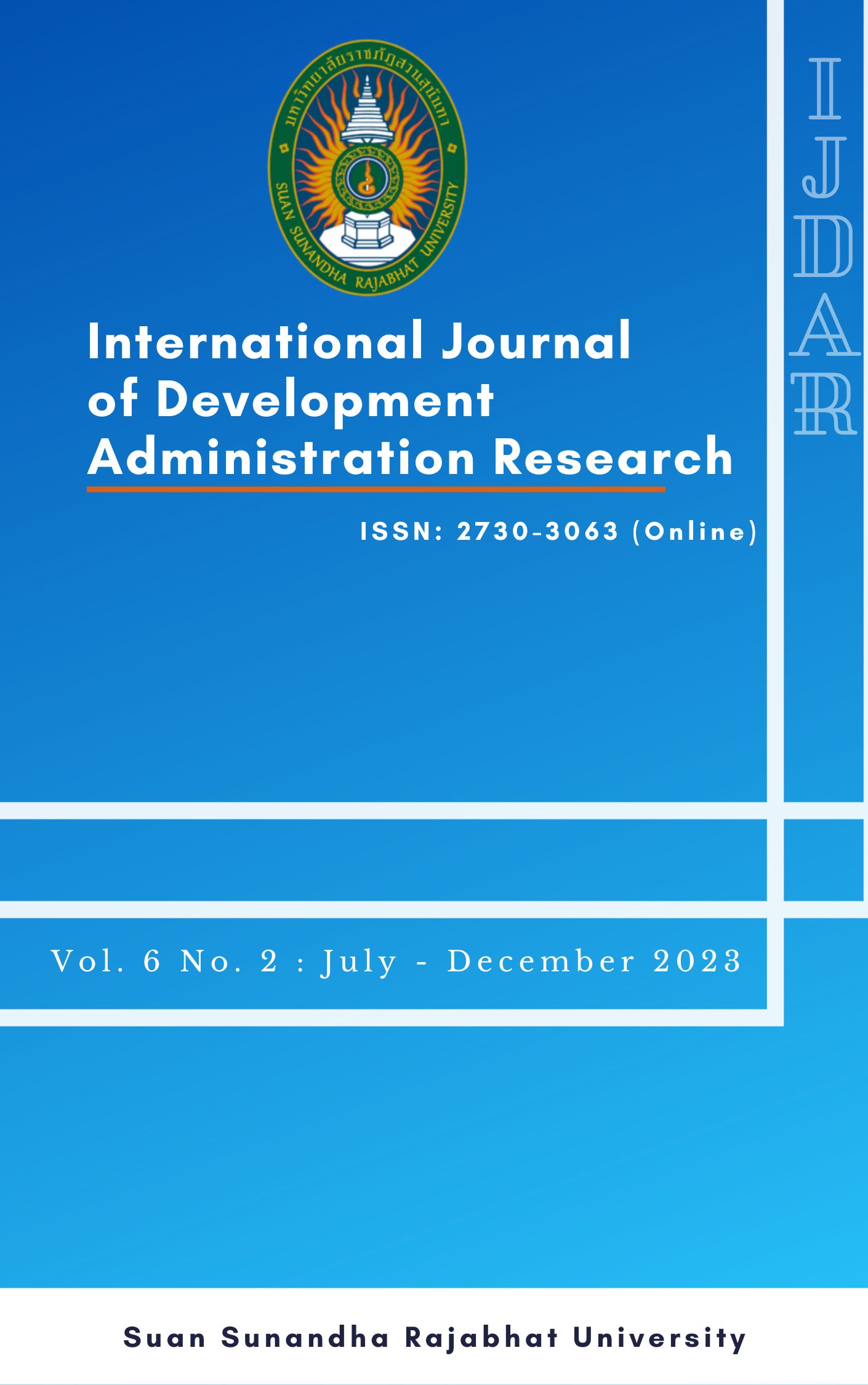Budget Participation, Budget Commitment and Job Performance in the Context of a Private Chinese University: An Exploratory Analysis of ABC University
Main Article Content
Abstract
The purpose of this study is to explore the impact of budget participation on job performance of Chinese private university employees, as well as the impact of employee budget commitment on job performance. Through questionnaire surveys and regression analysis, it was found that budget participation and employee budget commitment are positively and moderately correlated with job performance. Suggest strengthening budget communication and information sharing, enhancing employees' awareness and motivation to participate in budgeting, supporting employees' participation in budget preparation, establishing evaluation mechanisms, and enhancing employees' awareness and ability to budget. These measures help improve budget participation and employee job performance.
Article Details
License Terms
All articles published in this journal are licensed under the Creative Commons Attribution–NonCommercial–NoDerivatives 4.0 International License (CC BY-NC-ND 4.0).
Under this license, users are permitted to:
- Share — copy and redistribute the material in any medium or format.
Under the following conditions:
- Attribution (BY)
Users must give appropriate credit to the author(s) and the journal, provide a link to the license, and indicate if any changes were made. Attribution must not suggest endorsement by the author(s) or the journal.
- NonCommercial (NC)
The material may not be used for commercial purposes. Any use primarily intended for or directed toward commercial advantage or monetary compensation is prohibited without prior written permission from the copyright holder.
- NoDerivatives (ND)
If users remix, transform, translate, adapt, or build upon the material, they may not distribute the modified material. The work must be shared in its original and unaltered form.
This license ensures that published works remain freely accessible to the academic community and the public, while protecting the integrity of the original research and the rights of the author(s).
For the full legal code of this license, please visit:
https://creativecommons.org/licenses/by-nc-nd/4.0/
References
Brownell, P. (1982). The role of accounting data in performance evaluation, budgetary participation, and organizational effectiveness. Journal of Accounting Research, Wiley Blackwell, vol. 20(1), pages 12-27. DOI: http://hdl.handle.net/10.2307/2490760
Chong, V. K., & Chong, K. M. (2002). Budget goal commitment and informational effects of budget participation on performance: A structural equation modeling approach. Behavioral Research in Accounting, 14(1), 65-86.
Dakurah, A. A. (2020). Assessing budgeting and budgetary control effectiveness of Credit Unions in the Upper West Region of Ghana. Research Journal of Finance and Accounting, 11(12), 1, 14. DOI: 10.7176/RJFA/11-12-01
Eckholm, B. G., Wallin, J., 2000. Is the annual budget really dead? The European Accounting Review 9 (4), 519–539.
Hansen, S. C., Otley, D. T., Van der Stede, W. A., (2003). Practice developments in budgeting: an overview and research perspective. Journal of Management Accounting Research 15(1), 95–116. DOI:10.2139/ssrn.410544
Jensen, M. C., (2001). Corporate budgeting is broken - let’s fix it. In: Harvard Business Review, 79(10), 94–101.
Kren, L. (1992). Budgetary Participation and Managerial Performance: The Impact of Information and Environmental Volatility. The Accounting Review, 67(3), 511–526. http://www.jstor.org/stable/247975
Locke, E. A., & Latham, G. P. (1979). Goal setting: A motivational technique that works. Organizational Dynamics, 8(2), 68-80. https://doi.org/10.1016/0090-2616(79)90032-9
Lukka, K., & Modell, S. (2010). Validation in interpretive management accounting research. Accounting, organizations and society, 35(4), 462-477. DOI: 10.1016/j.aos.2009.10.004
Lunardi, M. A., Costa da Silva Zonatto, V., & Constâncio-Nascimento, J. (2019). Relationship between leadership style, encouragement of budgetary participation and budgetary participation. Estudios Gerenciales, 35(150), 27-37. http://www.scielo.org.co/pdf/eg/v35n150/0123-5923-eg-35-150-27.pdf
Murdayanti, Y., Indriani, S., & Umaimah, W. (2020). Determinants of participative budgeting and its implication on managerial performance. Accounting, 6(7), 1305-1312. DOI:10.5267/j.ac.2020.8.020
Neely, A., Bourne, M., Adams, C., (2003). Better budgeting or beyond budgeting? Measuring Business Excellence, 7(3), 22-28. DOI:10.1108/13683040310496471
Otley, D. T., (1994). Management control in contemporary organizations: towards a wider framework. Management Accounting Research 5, 289–299. https://doi.org/10.1006/mare.1994.1018
Rachman, A. A. (2014). Effect of procedural justice on participatory budgeting through organizational commitment. Journal of Economics and Business, 17(3), 55-78.
Riketta, M. (2002). Attitudinal Organizational Commitment and Job Performance: A Meta-Analysis. Journal of Organizational Behavior, 23, 257-266. https://doi.org/10.1002/job.141
Sastrawan, H., Dewi, F. G., & Yuliansyah, Y. (2020). The effect of budgetary participation on managerial performance: internal control and organizational commitments as intervening variables. Journal of Social, Humanity, and Education, 1(1), 39-51. https://doi.org/10.35912/jshe.v1i1.131
Shields, J. F., & Shields, M. D. (1998). Antecedents of participative budgeting. Accounting, Organizations and Society, 23(1), 49-76. https://doi.org/10.1016/S0361-3682(97)00014-7
Silva, P., Mota, J., & Moreira, A. C. (2022). Budget participation and employee performance in real estate companies: the mediating role of budget goal commitment, trust and job satisfaction. Baltic Journal of Management, 18(2), 226-241.
DOI:10.1108/BJM-03-2022-0118
Sim, S., & Utami, W. (2018). Impact of budget participation on job satisfaction and employee performance with job relevant information (jri) as an intervening variable. Profita: Komunikasi Ilmiah dan Perpajakan, 11(1), 81-90. DOI:10.22441/profita.v11.01.006
Tahar, A., & Sofyani, H. (2020). Budgetary participation, compensation, and performance of local working unit: The intervening role of organizational commitment. Journal of Accounting and Investment, 21(1), 145-161. DOI: 10.18196/jai.2101142
Wa-Mbaleka, G. A. (2015). Budget participation and job performance in a non-profit organization: The mediating role of organizational identification (Doctoral dissertation). Trident University International.
Wulandari, D. E., & Riharjo, I. B. (2016). Effects of participatory budgeting on managerial performance with organizational commitment and leadership styles. Journal of Accounting and Research, 5(4), 1-15.


